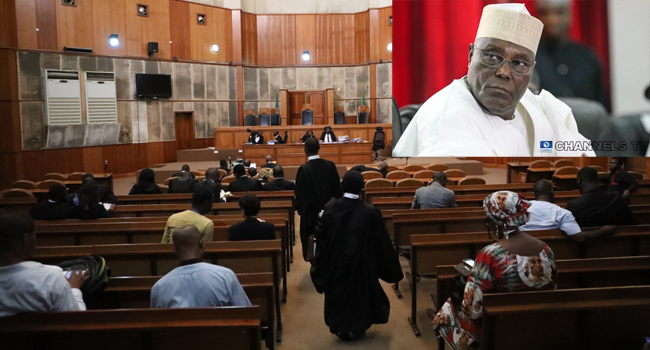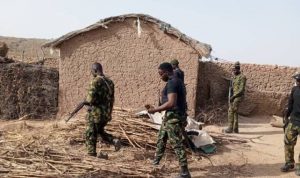Tribunal Turns Down PDP’s Request For More Time To Close Case

The Presidential Election Petitions Tribunal has turned down the request made by the Peoples Democratic Party (PDP) and its presidential candidate, Atiku Abubakar for more time to close their case.
This was after PDP lawyer, Chris Uche asked for more time from the Presidential Election Petition Tribunal.
Chairman of the tribunal, Justice Mohammed Garba says the tribunal will continue with proceedings till later in the day to enable the petitioners to close their case.
The Tribunal had earlier at the pre-hearing session granted the petitioners ten days to conclude its case and the ten days expire today, Friday.
READ ALSO: Presidential Election: INEC Presents Documents Requested By Atiku, PDP To Tribunal
Meanwhile, the PDP lawyers presented more documents to the Tribunal today. This is to justify their petition challenging President Muhammadu Buhari’s victory at February 23, 2019 election.
The documents presented by the PDP include Expert Report of INEC’s Electoral Information Systems as revealed by Whistle Blowers Website, Downloaded documents from the website, Certificate of Compliance and Executive Summary for the 11 states under review.
However, lawyers to President Muhammadu Buhari and the All Progressives Congress (APC) however objected to the admissibility of the documents with a promise to give reasons for their objection in their final address
The Chairman of the tribunal, Justice Mohammed Garba noted their objections but admitted the documents as exhibits.
The party also called its 59th witness, David Njoga, an ICT expert from Kenya who claims to have obtained data from INEC server.
Under cross-examination, lawyers to President Buhari and the APC disagreed with the witness on the ground that the website where the witness obtained his data does not belong to INEC.
The PDP also tendered Forms EC8 a and EC8 B which are result sheets from seven local government areas in Kano State.
Lawyers to INEC, President Buhari, and the APC objected to the admissibility of the documents.
The chairman of the tribunal, however, admitted the documents as exhibits having noted the objection of the respondents.






